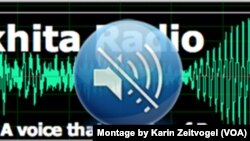The news editor of Juba-based Bakhita Radio was released Tuesday, four days after he was detained by national security agents who also ordered the radio station to stop broadcasting.
David Nicholas Ocen was released after the Union of Journalists in South Sudan mediated on his behalf and the director of Bakhita Radio, Albino Tokwaro, sent a letter of apology to the government for a report about renewed fighting in Unity state, Tokwaro said.
The government said the report on the clashes near Bentiu, which aired on Saturday, blamed its troops for starting the fighting. The story included a quote from acting SPLA spokesman Joseph Marier Samuel, who said rebel forces started the fighting in Unity state by attacking government positions, and rebel spokesman Peter Riek Gew who said quite the opposite -- that government troops attacked positions held by his side.
Ocen and his colleagues were detained on Saturday, shortly after the story aired. Because he was the lead author of the story, Ocen was held in custody until Tuesday, while his colleagues were released after a few hours.
The government does not want us to continue with some political programs.Albino Tokwaro, director of Bakhita Radio
Tokwaro said that although Ocen was free, the radio station was still off the air. When it resumes its broadcasts, things are likely to be different, he said, because the security services have asked the Catholic church, which runs Bakhita Radio, "to go and discuss with them the modalities of the programs that will be presented."
"The government does not want us to continue with some political programs,” Tokwaro said.
Harassment of media
The East Africa representative of the Committee to Protect Journalists (CPJ), Tom Rhodes, has said at least 10 journalists have been threatened or detained since South Sudan plunged into conflict in December.
“Security forces in various different offices act with total impunity when it comes to the press. They harass and detain journalists at will,” Rhodes said.
He said that truthful reporting has become a casualty of South Sudan’s conflict, at a time that people desperately need to know the facts.
“We are seeing such a high level of censorship that I worry the South Sudanese public are not getting an accurate picture of what’s going on,” he said.
U.S. Department of State spokeswoman Marie Harf said the United States is "monitoring the situation closely" and "urged the government of South Sudan to fully adhere to its constitutional guarantees and international obligations."
Government: Journalists free to report on conflict
South Sudan presidential spokesman Ateny Wek Ateny insisted that journalists are free to report on the conflict in the country, as long as they respect certain limits.
“You cannot just say anything, anytime. You have to calculate the consequences of the words you want to give to the public. Just because you’re a journalist, it’s not a ticket to say anything, anytime,” he said.
On Monday, Ateny said the report aired by Bakhita Radio had left the army vulnerable and was, therefore, a violation of national security. That kind of reporting, he said, will not be tolerated by the government.
Veteran South Sudanese journalist Jacob Akol said the government should not "pretend there is freedom of the press in South Sudan while at the same time letting the security loose on the press."
"While the media is told they are free to report anything within the law, media houses are closed and journalists are arrested, detained or intimidated by the security (services), without reference to any law," Akol told South Sudan in Focus in an email.
"This is a very unhealthy and confusing position for the media" and was creating a climate of fear, Akol said.
The U.N. humanitarian coordinator in South Sudan, Toby Lanzer, said in a live chat on Twitter that the United Nations was "concerned" about the shutdown of Bakhita Radio and the "apparent hardening of the media climate in South Sudan."
.@innercitypress @UN is concerned about forced closure of Bakhita Radio & apparent hardening of media climate in #SouthSudan. #PressFreedom
— Toby Lanzer (@tobylanzer) August 19, 2014





